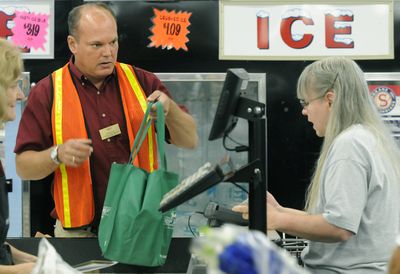Petition seeks fee for bags
Pullman woman hopes city will follow Seattle’s lead on disposables

Pullman may join big urban centers such as Seattle by taxing plastic grocery bags in an effort to encourage shoppers to reuse and recycle.
In a movement spearheaded by Washington State University professor and Pullman resident Elizabeth Siler, residents are signing a petition asking the Pullman City Council to require a 20-cent fee on each plastic bag dispensed in retail stores. Siler’s group suggests that the fee take effect Jan. 1.
On Monday, Seattle joined the so-called PlasTax bandwagon. Effective Jan. 1, a 20-cent fee will be charged for paper or plastic disposable bags. Polystyrene food containers will be banned.
City councils in San Francisco, Oakland and Los Angeles have taken similar action.
“It’s not like we’re doing something unusual,” Siler said. “It’s not really that radical an idea.”
Around 100 people have signed the petition Siler will present to the Pullman City Council on Aug. 26, when WSU is back in session. Supporters include city residents and those who live in outlying areas but shop in Pullman, she said.
While not specifying a use for the 20-cent fee – which would be collected by retailers – the petition suggests using it for beautification and cleanup in Pullman.
City Supervisor John Sherman said council members will consider other cities’ approved ordinances when making their decision.
“Typically cities don’t like to be the first one out on the plank,” he said, noting the fear of lawsuits.
He said the council will weigh economic concerns along with environmental impacts.
“Right now, with the high cost of food, we are very concerned about adding additional costs to people,” he said. Sherman said there’s a chance the measure will fail for that reason.
“I think it will be very controversial,” he said.
Trev McCuaig, the director of Dissmore’s IGA in Pullman, opposes the proposal.
“As a retailer, I don’t feel I should charge people for a choice between paper or plastic,” he said.
Siler said she was moved to action after counting 55 plastic bags along a stretch of Highway 195 last year.
“I saw one blowing the other day and it had a life of its own,” she said. “I thought, ‘You know, this isn’t right. It’s ugly, it looks terrible.’ ”
Siler also worried about the bags’ effects on the environmental.
“A plastic bag we get today at a grocery store in Pullman that accidentally blows out of the car window will be here longer than any of us,” she said. “I am going to biodegrade in 100 years or less. But that bag out my window will be there another 1,000 years, breaking down, choking animals, creating environmental havoc.”
More than 380 billion plastic bags, sacks and wraps are consumed in the United States each year, according to reusablebags.com, which advocates the use of alternatives to plastic. Plastic bags cause more than 100,000 marine animal deaths a year when animals mistake them for food, the Web site says.
Siler said while the plan would require a change in habit – remembering to carry reusable bags to the grocery store – it’s an easy one to pick up.
She has eight reusable cloth bags.
“I’ve been using one on and off for 23 years,” she said. “It’s as old as my daughter.”
Her daughter, a graduate student in Berkeley, Calif., and her middle-school-age son have gone cloth, too. “When we get out of the car my son says, ‘How many bags do we need?’ ”
Dani Klontz, the second assistant at the Pullman Safeway, said she empties the store’s bins for recycled plastic bags frequently, suggesting to her that shoppers are attuned to recycling. Every day, Siler said, she gets more signatures on her petition.
“I’m very hopeful,” she said. “Every time I go to (grocery stores) I see more and more people carrying their own bags.”